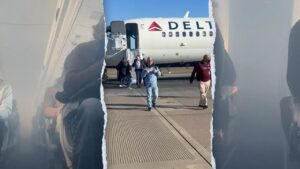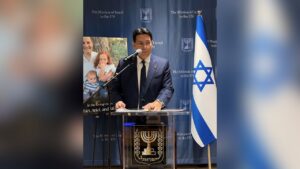A document that a U.S. special envoy has said could be a blueprint for talks to end the war started by Russian President Vladimir Putin would see Ukraine effectively capitulate to his demands, the Institute for the Study of War (ISW) has said.
The think tank based in Washington, D.C, gave its assessment of a suggestion by President Donald Trump’s special envoy to the Middle East, Steve Witkoff, that the Istanbul talks from 2022 could be a framework for negotiations between Russia and Ukraine.
Moscow would back the protocols but would force Ukraine to give in to all of Russia’s demands, the ISW said. Newsweek has contacted the U.S. State Department for comment.
Why It Matters
Trump has criticized his Ukrainian counterpart Volodymyr Zelensky who has responded by saying that the U.S. leader has fallen victim to Russian disinformation. As ties between Kyiv and Washington sour, any push for a deal such as the Istanbul protocols by Trump will raise fears that Putin will be rewarded for his aggression.
What to Know
Witkoff told CNN on Sunday that Istanbul protocols from March and April 2022 offered “guideposts” for talks between Russia and Ukraine to end the fighting.
At the beginning of the invasion in 2022, between February and April, Ukrainian and Russian officials engaged in direct peace talks in Istanbul—the only time they were known to have done so.
The Wall Street Journal and The New York Times reported in 2024 they had seen versions of proposals from the negotiations in the Turkish city.
They demand Ukraine to forgo NATO aspirations and remain permanently neutral, prohibit Kyiv from receiving foreign weapons, hosting foreign personnel and limiting the size of its forces and equipment.
The range of Ukrainian missiles would also be limited, which would allow Russia to deploy systems close to Ukraine’s border without fear of strikes and among the guarantors of the treaty would be Belarus, whose leader is Vladimir Putin’s closest ally.
However, the ISW said that Ukraine is unlikely to accept any peace agreement based on the Istanbul negotiations because they would be effectively a full Ukrainian surrender to Russia’s long-term war goals.
This is because they effectively conceded to Russia’s long-standing demands to “denazify” or overthrow and replace the democratically elected Ukrainian government and install a pro-Russian puppet state as well as constrain the Ukrainian military so it could not defend itself against future Russian aggression.
On Monday, Russian Foreign Minister Sergey Lavrov said Moscow would only agree to a ceasefire when negotiations provide a result that suits Moscow.
The U.S. held the first round of talks directly with Russia on February 18, excluding Ukraine from the meeting.
Research from the Quincy Institute think tank shared with Newsweek said that the Trump administration has leverage over Russia in any potential talks.
This includes the U.S. expanding or constraining its force posture in Europe depending on Russia’s willingness to compromise.
Moscow returning to Western diplomatic forums could also be an incentive but any meeting between the U.S. and Russian presidents should only be offered in exchange for genuine progress toward ending the war, the Quincy Institute said.
In a statement to Newsweek on Monday, Agnès Callamard, Amnesty International’s secretary general, said any negotiations must prioritize justice for all crimes under international law committed since Russia’s first invasion in 2014, as well as accountability for those responsible, and reparations for victims.
What People Are Saying
Steve Witkoff, U.S. special envoy to the Middle East, said: “There were very, very what I’ll call cogent and substantive negotiations framed in something that’s called the Istanbul Protocol Agreement.
“We came very, very close to signing something, and I think we’ll be using that framework as a guidepost to get a peace deal done between Ukraine and Russia.”
Institute for the Study of War: “An agreement based on those protocols would be a capitulation document…Ukraine is unlikely to accept any peace agreement based on the Istanbul negotiations as such terms are effectively a full Ukrainian surrender to Russia’s long-term war goals.”
Russian Foreign Minister Sergey Lavrov on Monday: “We will cease hostilities only when these negotiations produce a firm, sustainable result that suits the Russian Federation.”
What Happens Next
The White House said a peace deal with Russia could be discussed this week and announced were a second round of talks in Saudi Arabia on Tuesday.
Russian Deputy Foreign Minister Sergei Ryabkov said on Saturday that preparations were underway for a meeting between Trump and Putin.
Read the full article here

















